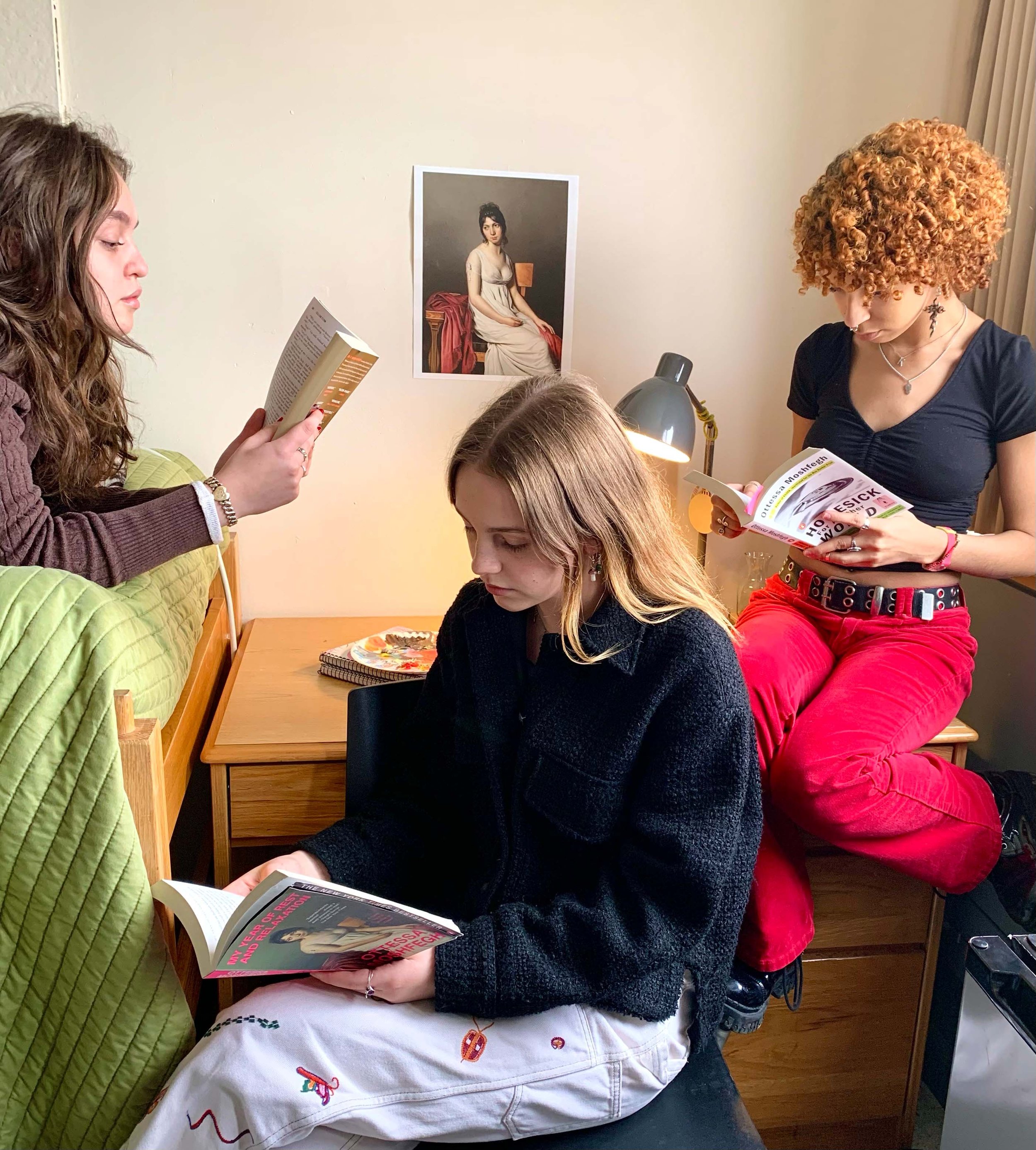Why Am I In My Fleabag Era?
Jessica Prendaj '25, Hana Dempsey '25 and Kiara Espinal '25 pose reading some of the books mentioned. Lily Jandrisevits '25
Young women flash across my social media. They hold their phones at a high angle, under eye bags on full display with mascara running down their cheeks. Over their beautiful sadness, they write paragraphs that express their feelings as encapsulated by Tik Tok user @bbcprideandprejudice: “Men will never understand what it’s like to be in ur fleabag era. To seek vengeance for fun… To be a WOMAN BORN WITH PAIN BUILT IN.”
Other posts opt for a picture of a character, like Love from You, a woman willing to kill anyone in the name of her intense love, with phrases like, “She’s just like me fr” written over an image of her sharpening a knife.
Moreover, books like “My Year of Rest and Relaxation”, which features a rich, beautiful and sad unnamed narrator who wants to sleep for a year (assisted by dubiously prescribed medications) who constantly treats the people around her as pawns, have become emblematic of this collection of what has often been called media starring “unhinged women” or antiheroines – the internet’s new favorite thing to romanticize.
In an article for Harper’s Bazaar, Yasmin Omar said that this rise of the antiheroine can be attributed to streaming services allowing for more content that can appeal to more specific audiences instead of having to broadly appeal to everyone. Omar also states that the rise in female creators has allowed for more of these diverse representations where a woman can be (gasp) potentially unlikable.
However, as exemplified by the social media posts previously described, many women have come to identify with these characters. Specifically, the proclamation of being “in my Fleabag era” relates to Phoebe Waller-Bridge’s show, Fleabag, where she plays the main character with the titular name. Fleabag is, as Parul Sehgal explained in the New York Times, “anarchy in a tightly belted trench coat with a brightly painted mouth.” In the depression of losing both her mom and best friend, Fleabag causes havoc, makes bad decisions, sleeps with people who will only make her feel worse and makes jokes at the wrong time; all with a literal wink to the audience as she breaks the fourth wall and talks directly into camera.
In the article, “The Smartest Women I Know Are All Dissociating,” Emmeline Clein talks about “dissociative feminism.” She explains that now, instead of the #girlboss, non-stop grind feminism of the early 2000s, women are “interiorizing our existential aches and angst.” Like Fleabag, we maintain our pain with a knowing smirk.
I think that the early 2010s served as a transition between the girlboss to the fleabag-ification of everything, especially for the young women who grew up with the internet, specifically Tumblr. What was popular a decade ago was the “sad girl” who wore all black, wrote poetry about wilting roses and tombstones and was, as always, beautifully crying.
Now, that seems a little too on the nose. Women are not just expressing themselves as helplessly sad, but as unhinged. Sadness somehow does not seem like enough for the circumstances. Now, rage is in style.
Of course, as Clein points out, dissociative feminism is not enough. Fleabag herself heals at the end of the show and stops relying on her interactions with us as audience members and begins to live her life. She makes healthier decisions, she is still flawed, but growing and accepting her difficult emotions.
Still, there are critics like Dennis Harvey who said perhaps Margot Robbie would be better than Carey Mulligan for the role of Cassandra in the movie, “Promising Young Woman” because Mulligan, “wears her pickup-bait gear like bad drag.” A sentiment that many took to mean that Mulligan was not ‘hot’ enough for the role – mind you, within a movie that is actively criticizing many societal expectations for women – it is not hard to understand why many women are reacting with anger. Variety later added an editor's note apologizing for “insensitive language.”
Although identifying with women like Fleabag can come with some lack of nuance, the inclination to do so makes sense. While seeming like a part of a larger aesthetic trend, the rise of the unhinged female lead is not something I see as wholly bad. In the least, it shows a cultural shift: women are not just sad about the situation they are in, they want revenge.
